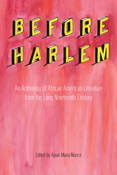Before Harlem
An Anthology of African American Literature from the Long Nineteenth Century

Despite important recovery and authentication efforts during the last twenty-five years, the vast majority of nineteenth-century African American writers and their work remain unknown to today’s readers. Moreover, the most widely used anthologies of black writing have established a canon based largely on current interests and priorities. Seeking to establish a broader perspective, this collection brings together a wealth of autobiographical writings, fiction, poetry, speeches, sermons, essays, and journalism that better portrays the intellectual and cultural debates, social and political struggles, and community publications and institutions that nurtured black writers from the early 1800s to the eve of the Harlem Renaissance.
As editor Ajuan Mance notes, previous collections have focused mainly on writing that found a significant audience among white readers. Consequently, authors whose work appeared in African American–owned publications for a primarily black audience—such as Solomon G. Brown, Henrietta Cordelia Ray, and T. Thomas Fortune—have faded from memory. Even figures as celebrated as Frederick Douglass and Paul Laurence Dunbar are today much better known for their “cross-racial” writings than for the larger bodies of work they produced for a mostly African American readership. There has also been a tendency in modern canon making, especially in the genre of autobiography, to stress antebellum writing rather than writings produced after the Civil War and Reconstruction. Similarly, religious writings—despite the centrality of the church in the everyday lives of black readers and the interconnectedness of black spiritual and intellectual life—have not received the emphasis they deserve.
Filling those critical gaps with a selection of 143 works by 65 writers, Before Harlem presents as never before an in-depth picture of the literary, aesthetic, and intellectual landscape of nineteenth-century African America and will be a valuable resource for a new generation of readers.
